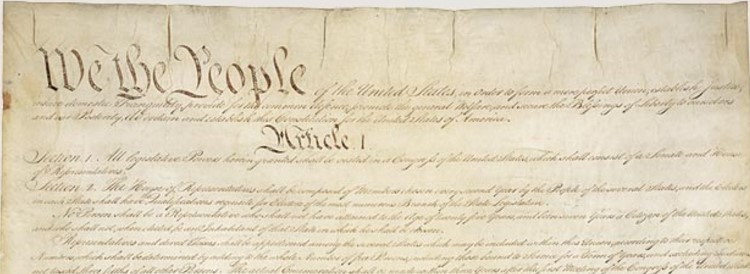All Bills for raising Revenue shall originate in the House of Representatives; but the Senate may propose or concur with Amendments as on other Bills.
If a tax needs to be instituted, it must come from the House. The Senate cannot originate such a bill, although it must approve it before it goes to the President either to be approved or vetoed. The Senate can suggest changes to the bill.
Every Bill which shall have passed the House of Representatives and the Senate, shall, before it becomes a Law, be presented to the President of the United States; if he approve he shall sign it, but if not he shall return it, with his Objections to that House in which it shall have originated, who shall enter the Objections at large on their Journal, and proceed to reconsider it. If after such Reconsideration two thirds of that House shall agree to pass the Bill, it shall be sent, together with the Objections, to the other House, by which it shall likewise be reconsidered, and if approved by two thirds of that House, it shall become a Law. But in all such Cases the Votes of both Houses shall be determined by Yeas and Nays, and the Names of the Persons voting for and against the Bill shall be entered on the Journal of each House respectively. If any Bill shall not be returned by the President within ten Days (Sundays excepted) after it shall have been presented to him, the Same shall be a Law, in like Manner as if he had signed it, unless the Congress by their Adjournment prevent its Return, in which Case it shall not be a Law.
Okay, Presidential Veto, here we come!
When a bill is to become a law, it will go to the President. If the President and signs it, it becomes a law. If the President does not approve, the bill is sent back to the House or Senate (depending on where the bill originated) along with the objections to the bills. The President is obligated to explain why in cases of a veto.
However, and this is where we really start getting into checks and balances, if Congress really disagrees so strongly that two-thirds (290 people in the House, and 67 in the Senate) of its membership will vote in favor of the bill, it becomes a law anyway.
If the President sits on a bill for ten days (excluding Sundays), it becomes a law anyway and it is presumed that the President did, in fact, approve the law.* If, however, Congress adjourns before the President can sign it, the clock stops ticking, and the bill does not become a law.
Every Order, Resolution, or Vote to which the Concurrence of the Senate and House of Representatives may be necessary (except on a question of Adjournment) shall be presented to the President of the United States; and before the Same shall take Effect, shall be approved by him, or being disapproved by him, shall be repassed by two thirds of the Senate and House of Representatives, according to the Rules and Limitations prescribed in the Case of a Bill.
If Congress has to vote on something to be enacted, the matter must be referred to the President for approval or disapproval. This also re-iterates the override of the Presidential veto.
* Speculation on the part of the author: If this little clause could be used as a sort of weasel-worded way of claiming disapproval of a law while still allowing it to be enacted. Though being a layman, the author cannot recall if this is common practice or not.

